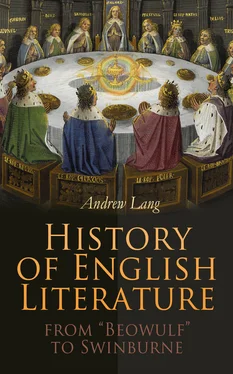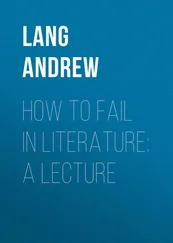The poet has given to his lay the charm of sorrow not without hope, and a dainty grace of artifice that is not insincere; "of his tears are pearls made".
As to the author of "Pearl," there is much difference of opinion. Nothing in the two edifying poems in the same manuscript, "Cleanness" and "Patience," makes it improbable that he wrote them. "Gawain and the Green Knight" is a very different composition, yet of lofty character; the author of "Pearl" may have written it, just as the author of "The Lotus Eaters" wrote "The Northern Farmer," and "The Charge of the Light Brigade".
With a number of other poems, "Pearl" has been claimed for a Scot, Huchown, Sir Hugh of Eglintoun, an Ayrshire laird, known as a fighting man, a diplomatist, and a judge, in the reign of David II of Scotland; he "flourished" between 1342 and 1377. Or perhaps Huchown was a priest, nobody knows.
The process of argument is this; some forty-three years after Sir Hugh died, in 1420, a Scottish writer of history in rhyme, Wyntoun, produced his "Orygynale Cronykil" (his spelling is original enough). He says that "Huchown of the Awle Ryale," wrote learnedly, on the Brut and Arthur themes, in his "Geste Hystorialle," that is a rhymed romance named "Morte Arthur". Wyntoun also says that Huchown made the "Gret Gest off Arthure" (apparently the "Morte Arthur"), the "Awntyre off Gawaine" (perhaps "Gawain and the Green Knight," or perhaps the "Awntyrs of Arthur"), and the "Pystyll of Swete Susane" (a poem still extant, on Susannah and the Elders, the story in the Apocrypha).
Some claim for Huchown not only these pieces, but "Pearl," "Cleanness," and "Patience," and long poems on Alexander the Great, and the Tale of Troy, and much more. Huchown, on this theory, must have been a professional poet, yet he has been identified, we saw, with Sir Hugh of Eglintoun, a soldier, diplomatist, and man of affairs.
It is certainly improbable that a man so busy as Sir Hugh of Eglintoun wrote such a huge mass of poetry unless he were as energetic as Sir Walter Scott.
The great alliterative "Morte Arthur" wanders from the true way, pointed out in the ancient Welsh verses on "The Graves of Heroes," and by Layamon. "The Grave of Arthur" is no mystery to honest Huchown; of the King it cannot be said "in Avalon he groweth old," he does not dwell with "the fairest of all Elves": he is buried at Glastonbury, a fable invented late, in the honour of that beautiful and desolate home of old religion.
Huchown shows that he was intimately familiar with minutiæ of English law, which Sir Hugh of Eglintoun was more likely to know than an obscure parish priest. Many other curious arguments in favour of Sir Hugh of Eglintoun as author of the "Morte Arthur" have been set forth (by the learned ingenuity of Mr. George Neilson, who also claims for him "Pearl"), but we still marvel how a busy man like Sir Hugh, living in a rough age, found time for all his labours.
The "Pistyl of Susan" adds little, save in one passage, to the laurels of Huchown. It is a tale of Susannah and the Elders, told in stanzas, both alliterative and rhyming, of eight lines, followed by one short line of two syllables, then come three, rhyming lines of three feet, and a fourth rhyming to the first in this set: thus,
And told
How their wickedness comes
Of the wrongous dooms
That they have given to gomes (men)
These Judges of old.
The garden of Susan is described in a manner both copious, florid, and inconsistent with botanical science, but there is a touching scene between the falsely-accused Susan and her husband.
Huchown is also credited with the "Awntyrs (Adventures) of Arthur"; which contains a curious appearance of the ghost of Guinevere's mother to Sir Gawain and "Dame Gayenour," Guinevere. This is certainly "the gryseleste gaste,"—the grisliest of ghosts, but she has all of Huchown's delight in theology and edification, prophecy, heraldry, and hunting. The metre is not unlike but is not identical with that of "Susan".
By Scottish critics the "Morte Arthur" and "Susan," at least, are claimed for the Ayrshire bard, Sir Hugh, and, if they are right, Scotland was civilized enough, and fortunate enough, to have a considerable poet before Barbour, author of "The Brus" (1376), a rhymed history of King Robert Bruce, the great hero of his country. But the literature of Scotland is more conveniently to be treated in a separate chapter.
Table of Contents
Hitherto we have known scarcely anything about the lives, and usually have not even known the names, of the writers in English verse and prose. About
The Morning Star of Song who made
His music heard below,
about Geoffrey Chaucer, we know more than we do of Shakespeare.
Chaucer is the earliest English poet who is still read for human pleasure, as well as by specialists in the studies of literature, language, and prosody. A few of his lines are part of the common stock of familiar quotations. Coming between two periods of literary twilight—the second saddened rather than cheered by notes more like those of the owl than of the lark and nightingale,—Chaucer is himself the sun of England during the age of the glory and decline of the Plantagenets. His "Canterbury Tales" show us the world in which he lived, or at least part of that world; his pilgrims are personages in that glorious pageant which Froissart painted—kings, ladies, nobles and knights in steel, or in velvet and cloth of gold; tournaments glitter in all the colours and devices of the heralds—while the horizon is dim with the smoke of burning towns and villages.
It is not really possible to say what conditions produce great poets: they may arise in times of peace or war; in times quiet or revolutionary; at prosperous Courts or in the clay-built cottages of peasants. At least Chaucer lived a long time in an age eagerly astir, lived through the light cast by the great victories of Edward III,—Crécy and Poitiers,—the years when London knew two captive Kings, John of France and David of Scotland; the years when Edward turned away from the all-but conquered Scotland to fight the France which he could not conquer. Chaucer knew the Court triumphant, and the Court overshadowed by the discredited old age of Edward III, the fatal malady of the Black Prince, the troubles of the minority of Richard II, and the peasant rising of Wat Tyler. He had his part in the patronage of that art-loving King, by character and fate more resembling a Stuart than a Plantagenet; and he was in friendly relations with the rising House of Lancaster. He marked the dawn of the religious and social revolution in the doctrines of Wyclif and of the Lollards, the hatred of the rich and noble, the scorn of priests and monks and friars. He felt the poetic influences of France and Italy, and, if not in Italy, certainly in France, had poetic friends. He bore arms in France: in Italy and France he fulfilled diplomatic duties; at home he held a courtly place; he sat in Parliament; he was a complete man of the world and of affairs, as well as a man of learning and of letters. He was always of open, kind, and cheerful humour; still, when nicknamed "Old Grizzle" by his friends, dipping a white beard contentedly in the Gascon wine; still "not without the lyre," not a deserter of the Muse. His portrait, as Old Grizzle, white-bearded and white-haired, a rosary in his hand, shows a face refined, kindly, and humane.
The father of the poet, John Chaucer, was a citizen of London, a prosperous vintner, or wine-merchant. The date of the poet's birth is unknown, that he died an old man in 1400 is certain. His birth year was for long given as 1328, when his father was scarcely 16, and was unmarried. The date 1328 for the poet's birth must be wrong, and the year 1340 is uncertain. In a trial of 1386, to decide whether the Scropes or Grosvenors had the better right to blazon the famous "Bend Or," Chaucer was described as "of the age of forty years and more, having borne arms for twenty-seven years". "And more" is vague, we cannot be certain that it means "just over forty years of age," though that (as far as I have observed) is the usual meaning in old records of ages of witnesses. In some cases, on the other hand, they are given most incorrectly. Chaucer's own remarks about his "eld" in late poems, tell us little; at 40 Thackeray wrote of himself as if he "lay in Methusalem's cradle".
Читать дальше












